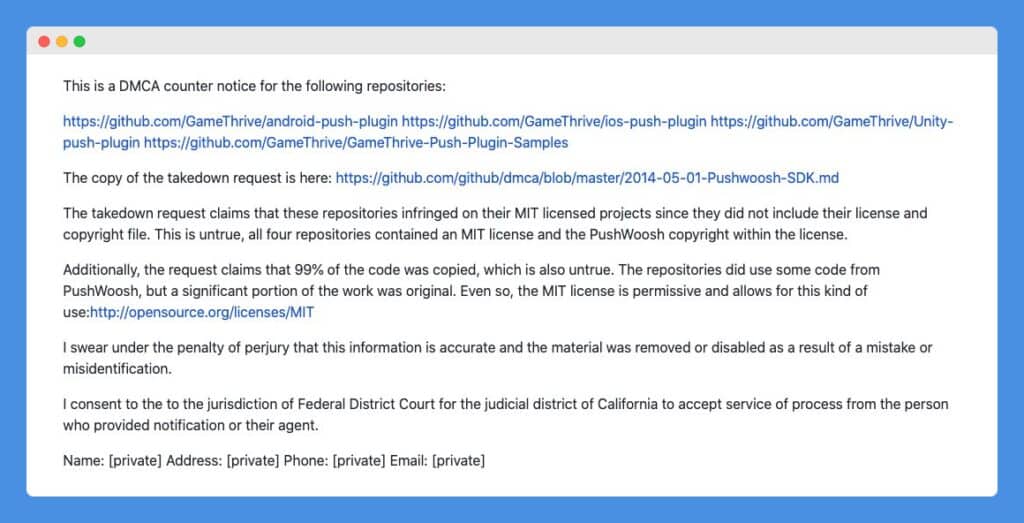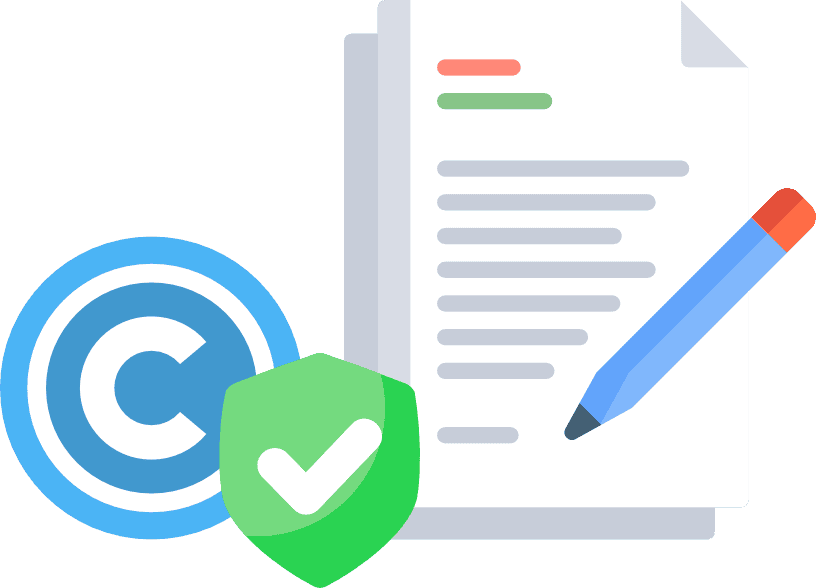As a website owner, not much is scarier than getting an email from your hosting service provider saying that some or even all of your content has been taken down. Especially if the reason behind that removal is that they have received a copyright infringement complaint against you.
Table of Contents
PRO TIP: Don’t waste your time and take the guesswork out of the legal jargon with this personalized DMCA policy generator trusted by over 200,000 businesses.
I Got a DMCA Notice! What Do I Do?

First – don’t panic.
Receiving a DMCA takedown notice from your internet service provider (ISP) or online service provider (OSP) doesn’t always mean that the claim has merit.
Online service providers have to act expeditiously to remove content when they receive notice of an alleged infringement as it is one of the conditions that they have to fulfill in order to benefit from the safe harbor provisions of Section 512 of the DMCA.
Service providers generally do not analyze the complaint to determine if there actually is an infringement or not due to the sheer number of notices that they receive every day, they simply make sure that the DMCA notice contains the information that is required by law.
They do, however, have to notify you that they have taken down your content so that you can respond if you think that it was a wrongful claim.
Do Not Ignore It
If you did indeed copy an image from a photographer’s website or copied and pasted a blog article from someone else then the takedown notice was probably warranted as there is a good chance that there was indeed copyright infringement on your part.
In that scenario, you should take down the infringing content as soon as possible, if it hasn’t been taken down by your online service provider already, as there could be serious legal repercussions.
In other words, don’t ignore a DMCA request, take action if needed, and let the sender know that you did.
Request More Details
You can, of course, request more details from your service provider regarding the DMCA notice that they have received.
For example, a copy of the notice itself if it hasn’t been sent to you already, will show you the name of the copyright holder as well as information about the exact content that is at stake.
This could assist you in determining if the work is actually protected by copyright and help you confirm that the individual that submitted the takedown notice is indeed the copyright holder or its authorized agent. It could also facilitate discussion with that party should you wish to deal with the matter amicably.
Getting more details about the notice can also help you spot false DMCA claims that are safe to ignore.
Consult a Lawyer
If you’re not sure if you have committed copyright infringement or not you may wish to consult with an intellectual property lawyer.
The doctrine of fair use allows individuals to use copyrighted material without first requesting permission from the copyright owner in some limited circumstances only, namely criticism, comment, news reporting, teaching, scholarship, or research.
A few factors influence whether or not your use of copyrighted material can be considered “fair” such as the purpose and character of the use (commercial or educational), the nature of the work, the scale or amount of the work that was used, and the effect of your use on the copyrighted work’s potential market and value.
Examining and balancing these factors is complicated and often requires the analysis of case law, which is why consulting an attorney would be the smart thing to do in some cases.
They will be able to advise if filing a counter-notice using “fair use” as a defense is a good idea or not or confirm the validity of the license that you hold over the content if any.
More importantly, an intellectual property lawyer will be able to determine if the content that you used is subject to copyright in the first place, as not everything is protected by copyright (such as ideas, concepts, and works that have become part of the public domain).
Send a DMCA Counter-Notice
If you are convinced that your OSP has received a false or erroneous DMCA claim against your website and that your materials have thus been removed or disabled by mistake or misidentification, then you may wish to prepare a DMCA counter-notice under section 512(g) of the DMCA.
But make sure that you are prepared to make a statement in good faith, under penalty of perjury, that you believe that the material should not have been removed.
There is no specific timeframe in which you have to file your counter-notice, but you will want to act promptly if you want your content to be put back up by your service provider.
Indeed, once you send a counter-notice to an online service provider, it has to make your content available again no fewer than 10 but no more than 14 business days after receiving your counter-notice unless. During that time period, the party that claims infringement first lodges a lawsuit seeking a court order against you and notifies the online service provider to that effect.
Your counter-notice should be made in writing to the service provider’s designated agent and include the following elements:
- Your signature
- A few sentences describing the material that you believe was wrongly taken down and where it used to be located (URL of the page)
- A statement confirming that you have “good faith belief” that the material was “removed or disabled as a result of mistake or misidentification of the material to be removed or disabled” (this statement is made under penalty of perjury)
- Your contact details (full name, address, phone number, and email)
- A sentence stating that you consent to the jurisdiction of your local Federal District Court (if you are not located in the United States, the judicial district in which your service provider can be found)
- A statement confirming that you agree to accept service of process (be served with a lawsuit) from the person that submitted the initial takedown notice
Here is a counter-notice example that can be found in GitHub’s public repository:

How to Avoid DMCA Notices?
If you have yet to receive a DMCA notice, now is the time to take appropriate measures to prevent ever getting one.
The most obvious thing to do is to make sure that the content that you use on your website is original and, if it is not, that you have permission from the copyright holder to make use of that content or that you hold the appropriate license.
However, if you own a website or platform that displays user-generated content on which you do not necessarily have oversight, you should consider having a DMCA policy in place.
Having a detailed DMCA policy that explains how you manage copyright complaints and takedown notices, including mentioning that you have the duty as an online service provider to act promptly and remove or disable access to any allegedly infringing content upon receiving notice to that effect.
This will help build trust both with your users and with copyright holders. Your policy should also mention that your users can submit a counter-notification should they deem that the material was removed as a result of a mistake or misidentification.
This DMCA policy should form an integral part of your terms and conditions. You can refer to your detailed policy using a hyperlink in a clause to that effect.
By doing so, the people that choose to create an account or share content on your website will be agreeing to only post or share original content or content that they own the rights to.
Here is an example of a copyright infringement and DMCA Policy clause that appears in GitLab’s terms of use:

As you will note from the clause above, it links to a complete and detailed DMCA policy that addresses how Gitlab processes claims of copyright infringement and mentions the takedown notice and counter-notice requirements.
And you don’t have to spend hundreds of dollars to get a lawyer to draft a DMCA policy for you. You can simply use our handy and free DMCA policy generator to get an attorney-drafted custom-tailored document in a matter of minutes.
Final Words
Some takedown notices under the DMCA are sent almost automatically by copyright holders without them properly looking at your content and some are downright false and abusive. This is why it is important for you to know your options when it comes to reacting and responding to such a request.
You should keep in mind that there are penalties for knowingly materially misrepresenting and sending a counter-notification when you know that a takedown notice was, in fact, warranted. Therefore, such a situation requires careful handling and consideration.



